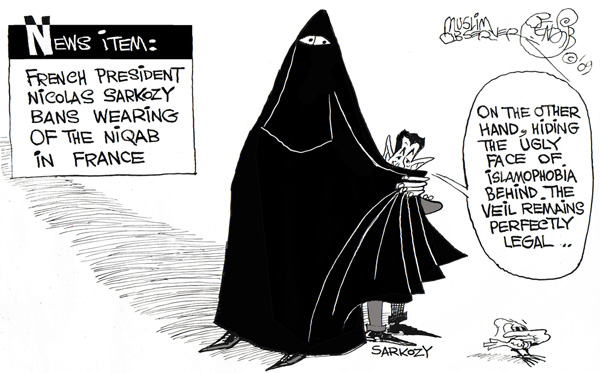Police in France, home to Europe’s biggest Muslim population, arrested two protesters wearing Niqab veils Monday after a ban on full-face coverings went into effect.
 Police in France, home to Europe's biggest Muslim population, arrested two protesters wearing Niqab veils Monday after a ban on full-face coverings went into effect.
Police in France, home to Europe's biggest Muslim population, arrested two protesters wearing Niqab veils Monday after a ban on full-face coverings went into effect.
The women, part of a demonstration that erupted in front of Notre Dame Cathedral in Paris, were detained for taking part in an unauthorized protest rather than for wearing their veils.
But, in theory at least, French officials can now slap fines on Muslim women who refuse orders to expose their faces when in public.
"Today was not about arresting people because of wearing the veil. It was for not having respected the requirement to declare a demonstration," said police spokesman Alexis Marsan. Two women in Niqab, a woman wearing an Islamic headscarf that did not cover her face and a protest organizer were arrested, Marsan said.
Two women in Niqab, a woman wearing an Islamic headscarf that did not cover her face and a protest organizer were arrested, Marsan said.
Separately, businessman and activist Rachid Nekkaz said that he and a female friend wearing the Niqab were arrested by police in front of President Nicolas Sarkozy's Elysee Palace.
"We wanted to be fined for wearing the Niqab, but the police didn't want to issue a fine," said Nekkaz, who has promised to auction off a two-million-euro property to start a fund to pay off fines for veil-wearers.
One of those arrested in front of Notre Dame was 32-year-old Kenza Drider from the southern city of Avignon, who was due to appear on television and has become a symbol of France's tiny community of Niqab wearers. Many French police fear the law will be impossible to enforce, since they have not been empowered to use force to remove head coverings, and could face resistance in already tense immigrant districts.
Many French police fear the law will be impossible to enforce, since they have not been empowered to use force to remove head coverings, and could face resistance in already tense immigrant districts.
"The law will be infinitely difficult to enforce, and will be infinitely rarely enforced," said Manuel Roux, deputy head of a union representing local police chiefs, in an interview with France Inter radio.
"It's not for the police to demonstrate zeal," he said, predicting that when patrol officers meet veiled women they will simply try to explain the law to them and to persuade them to remove their face covering.
"If they refuse, that's when things get really complicated. We have no power to force them," he said. "I can't begin to imagine we're going to pay any attention to a veiled woman in a sensitive area, where men are proud." But Interior Minister Claude Gueant insisted the ban would be enforced, in the name of "secularism and equality between men and women ... two principles upon which we cannot compromise."
"The police and the gendarmerie are there to apply the law and they will apply the law," The law came into effect at an already fraught moment in relations between the state and France's Muslim minority, with Sarkozy accused of stigmatizing Islam to win back votes from a resurgent far right. French officials estimate that only around 2,000 women, from a total Muslim population estimated at between four and six million wear the full-face veils that are traditional in parts of Arabia and South Asia.
French officials estimate that only around 2,000 women, from a total Muslim population estimated at between four and six million wear the full-face veils that are traditional in parts of Arabia and South Asia.
Many Muslims and rights activists say the rightwing president is targeting one of France's most vulnerable groups to signal to anti-immigration voters that he shares their fear that Islam is a threat to French culture.
But support for the ban bridges the left-right divide. Although the bulk of opposition lawmakers abstained from the vote on the law, 20 supported it and some feminists traditionally associated with the left support a ban on a garment they feel demeans women. Anyone refusing to lift his or her veil to submit to an identity check can be taken to a police station. There, officers must try to persuade them to remove the garment, and can threaten fines.
Anyone refusing to lift his or her veil to submit to an identity check can be taken to a police station. There, officers must try to persuade them to remove the garment, and can threaten fines.
A woman who repeatedly insists on appearing veiled in public can be fined 150 euros (216 dollars) and ordered to attend re-education classes.
There are much more severe penalties for anyone found guilty of forcing someone else to hide his or her face "through threats, violence, constraint, abuse of authority or power for reason of their gender."
Clearly aimed at fathers, husbands or religious leaders who force women to wear face-veils, and applicable to offences committed in public or in private, the law imposes a fine of 30,000 euros and a year in jail.
